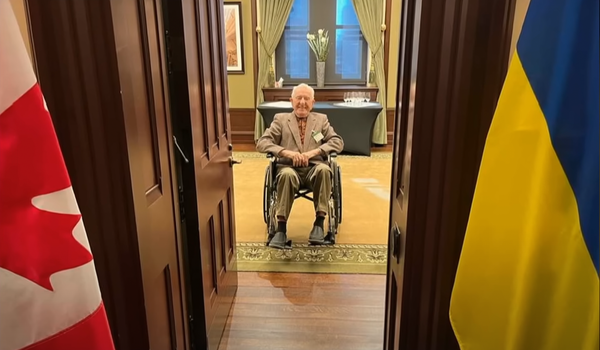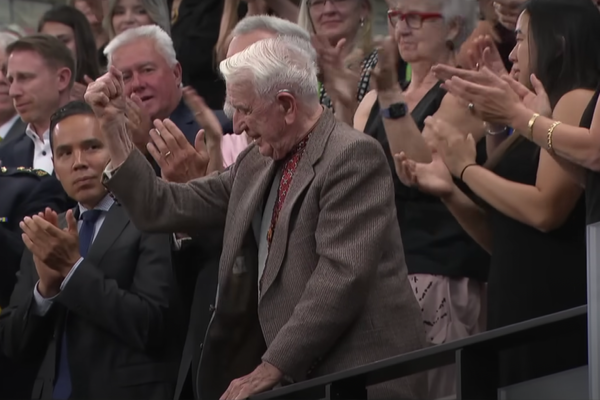Despite the scope and intensity of North American efforts to bring down Venezuela’s socialist government, both Canada and the United States have recently made diplomatic overtures to the Nicolás Maduro administration.
Amid rising oil prices in the aftermath of Russia’s invasion of Ukraine, the Biden administration dispatched representatives to Caracas to discuss increasing global oil supplies. The U.S. granted sanctions “carve-outs” for European companies seeking to invest in Venezuela.
Now, Washington has announced temporary sanctions relief in the lead up to Venezuela’s 2024 presidential election. While these measures are provisional — the U.S. government has already threatened to reimpose some sanctions on Venezuela’s oil sector — these are nevertheless positive changes for the country and the entire region.
For its part, Ottawa has sent “low-ranking diplomats” to Caracas to restore dialogue with the Maduro government. Following a meeting between Foreign Affairs Minister Mélanie Joly and her Peruvian counterpart, Ottawa released a document last fall stating that “Canada is seeking to reestablish diplomatic relations with Venezuela.”
Genevieve Tremblay, a spokesperson for Global Affairs Canada (GAC), said that while the Trudeau government still refuses to recognize Maduro as president, “Canada remains prepared to engage with those with whom we disagree; officials are committed to work with appropriate actors to restore and reinforce democracy and human rights in Venezuela.”
“Canada and Venezuela should have normal relations like any two countries,” said Maria Páez Victor, a Venezuelan sociologist living in Canada and the producer of Venezuela Viva, the only radio program in Toronto dedicated entirely to Venezuela. She was born in Venezuela, studied there, and regularly visits family and friends in the country. She is also highly active in opposing negative Canadian policies toward her homeland.
Páez Victor became involved in activism during the 2002 coup, when right-wing forces in Venezuela overthrew the country’s democratically elected president, Hugo Chávez, with U.S. backing. A popular uprising led by the country’s working class and urban and rural poor restored Chávez to power two days later.
When Chávez was elected with 56 per cent of the popular vote in 1998, he spoke of ending poverty and corruption. Through his government’s various experiments with workers’ cooperatives, participative democracy and communes, the Venezuelan people gave Chávez and his allies repeated election victories.
In response, the U.S. tried to organize his ouster. Canada stayed silent about U.S. interference in Venezuela or quietly participated, such as through the funding of right-wing opposition group Súmate.
“With the [2002] coup,” said Páez Victor, “we realized the mighty foreign enemies that Venezuela had. These enemies had joyfully backed the coup – particularly the U.S. and Canada, of course.”
Following the death of Chávez and the election of his successor, Nicolás Maduro, in 2013, U.S. and Canadian efforts to topple the Bolivarian Revolution intensified.
The U.S. hit Venezuela with a gamut of sanctions which, in the context of falling oil prices, cratered the Venezuelan economy. Meanwhile, Canadian government officials worked with right-wing figures on the ground in Venezuela, helping to organize the opposition around self-declared president Juan Guaidó in 2019.
Canada imposed sanctions while helping create and lead the Lima Group, an organization of conservative Latin American governments that aimed to overthrow Maduro. Ottawa also stripped the diplomatic credentials from the Venezuelan ambassador and charge d’affaires, denying the legitimacy of the Maduro government.
Páez Victor emphasized that Canada, not Venezuela, was the one who broke off the relations in the first place, and “with quite a vicious emphasis, not allowing even a small consular administrative office, not allowing any Venezuelan representatives to visit Canada to talk things over.”
These actions by Ottawa mean that Venezuelan Canadians in need of consular services must go to Mexico to receive assistance from the Venezuelan embassy there. In fact, anyone wishing to visit the country must apply for a visa through Mexico.
Now things may change. “I think [restored ties] would be a good step forward,” said Alison Bodine, a solidarity activist from Vancouver. “The solidarity movement has called [for this] since 2017 […] Our ability as people here in Canada to do solidarity is always improved when there is an official representative from the government of Venezuela here in the country.”
Of course, U.S. sanctions relief and Canadian diplomatic outreach is not unconditional. Their continuation is contingent on Washington and Ottawa interpreting the upcoming presidential election as “free and fair.” Regardless, the temporary thaw in relations may presage a restoration of ties — not friendly relations, but at least the mutual diplomatic representation that existed prior to 2017.
Solidarity Achieves Results
Ottawa and Washington’s overtures are not only occurring in the context of shifting geopolitical tides — they also come after years of sustained solidarity organizing by activist groups within Canada.
These groups aim to educate Canadians about events in Venezuela and the harms of foreign interference, while simultaneously forging connections with organizations inside Venezuela.
Though skeptical about the Canadian government’s good faith in the negotiations, these activists see the potential thaw in Canada-Venezuela relations as an opportunity to continue building bridges between progressive forces in both countries.
Educational initiatives are essential because, according to Páez Victor, Canadians know very little about what their government does abroad.
“The democratic tragedy of Canada is that Canadians know next to nothing what their ministry of foreign affairs does in their name,” she said. “I think that Canadians are very poorly served by an elitist, secretive and ultimately unaccountable foreign minister and ministry. Most don’t have any idea of the increasingly soiled reputation of Canada in the world today.”
As such, solidarity initiatives – such as public education projects, picket actions, trips and “report back” webinars – are useful for educating Canadians about the on-the-ground realities in a country their leaders constantly demonize.
“It is always exhilarating for me to go back to Venezuela,” said Páez Victor. “Every time, I see the amazing resilience and joyfulness of people who have suffered from terrible sanctions imposed by the U.S., Canada and the European Union. They have resisted and are even flourishing.”
In Alison Bodine’s words: “Every time I’ve traveled to Venezuela, I’ve learned a lot about the organizing, their society, people’s steadfast commitment to defending their sovereignty and self-determination, and [their efforts to] find solutions and survive and fight back against an external blockade.”
“Venezuelan society is an engaged society,” she added. “People are in constant mobilization in defence of their country and their decision to go forward with the Bolivarian revolutionary process.”
Bodine first visited Venezuela in 2017. Since then, she has returned another seven times to attend international solidarity meetings and anti-blockade conferences, and to observe elections (presidential and regional).
Venezuela solidarity groups in Canada frequently participate in such trips, meeting anti-imperialist groups from around the world as well as members of Venezuelan civil society, human rights organizations like SURES, the communes movement (specifically Unión Comunera), non-governmental groups investigating the impact of sanctions, and people within the ruling United Socialist Party of Venezuela (PSUV).
“Folks don’t know a lot about what’s happening in Venezuela,” she said. “People who listen to the CBC would likely think that Venezuela is a horrible dictatorship and that Canada is standing up for democracy and human rights by siding with the United States. But this is media manipulation.”
Canadian media, Bodine explained, has imposed a “blackout” on Venezuelan voices who support their revolutionary process. As such, Canadians at large don’t know about the positive gains of the Bolivarian Revolution, including the Great Housing Mission.
“Here in British Columbia, there’s been a housing crisis for thirty or forty years that they can’t seem to do anything about,” said Bodine. “[Yet] media in Canada doesn’t want to talk about how Venezuela has built over four million homes in the span of a decade to house their people.”
The Canadian solidarity movement has also formed various connections to groups inside the U.S., including the Alliance for Global Justice. Bodine hopes that this group, plus others like CODEPINK and the Task Force on the Americas, will continue organizing cross-border initiatives between Canadian and U.S. activists in the future.
As diplomatic relations thaw, however, activists in Canada and the U.S. are keeping their eye on Washington. Every positive development in Venezuela relations is tenuous, dependent on the North American powers deciding that restored ties are in their geopolitical interest.
As such, we have recently seen Washington move to restore some sanctions following the Venezuelan Supreme Court’s decision to bar far-right opposition candidate Maria Corina Machado from running for public office for 15 years.
Meanwhile, the flareup of tensions between Venezuela and Guyana over the Essequibo region, in which ExxonMobil has significant oil interests, threatens to destroy the small steps forward witnessed in the past few months.
December 2023 saw the 200th anniversary of the Monroe Doctrine. While James Monroe is long dead, his namesake doctrine is alive and well, as Washington still views Latin America as its playground.
Canadian policy has long supported this imperialist position. Nevertheless, the normalization of ties and the alleviation of sanctions against the Venezuelan people are undoubtedly positive developments, even if they are fragile. Solidarity activists must be prepared for the collapse of relations once more, as the U.S. and Canada may overturn these progressive gains the second they sense weakness in the Venezuelan leadership.
“Washington is a dangerous friend,” said Páez Victor, “and an even more dangerous enemy. Canadians should remember that. Solidarity with Venezuela is essential, especially for those of us who live in the U.S. and Canada. The work for peace never stops.”
Owen Schalk is a writer from rural Manitoba. He is the author of Canada in Afghanistan: A story of military, diplomatic, political and media failure, 2003-2023.






